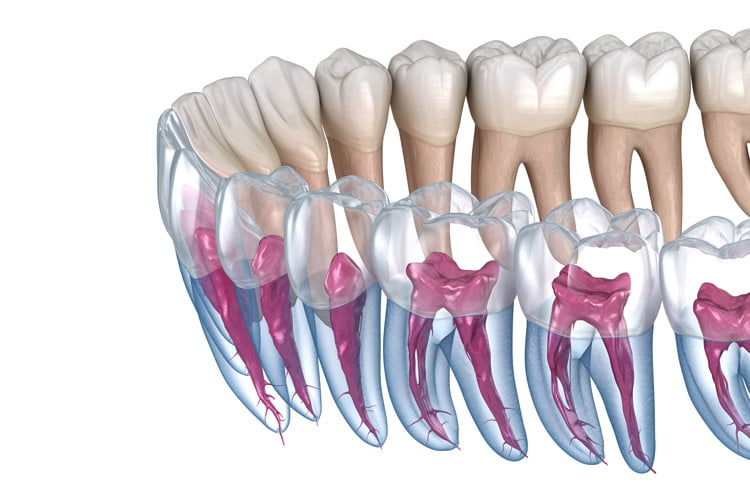Endodontic Specialists
An Endodontist is a specialty dentist that treats tooth roots and the pulp of teeth.
Dental Health Endodontics has one of the only board certified endodontists in the Madison area.
An endodontist is a dental specialist who has completed dental school followed by two or more years of advanced training focusing on treatment of the root and pulp of teeth. The pulp is a vital tissue that helps in the initial development of the tooth and contains blood vessels and nerves, and an endodontist treats diseases and injuries affecting the pulpal tissues.
An endodontist can also assess and recommend treatment for severely cracked teeth, teeth that have experienced trauma, or developing permanent teeth in children.

Referring Dentists
If you are a referring Dentist, you may use this referral form for your convenience: Online Endodontic Referral Form or click here for a printable version of the form.
Our Endodontist
Endodontic Myths
There are many misconceptions when it comes to root canals. Patients often delay treatment for this reason, causing further discomfort and expenses.
Myth: A root canal is painful
FACT: Root canal therapy is almost always performed as a result of an infected pulp, a broken tooth, or a dying nerve. While those conditions can be painful, not all endodontic problems are accompanied by pain. Some untreated problems can develop into larger infections, and this can not only greatly increase the chance of experiencing pain but also the treatment and recovery time. However, the root canal treatment itself is performed with local anesthetic, and the procedure is most often pain free. For a few days after the treatment, there may be some tenderness around the treated tooth.
MYTH: Root canal therapy causes illness
FACT: Much of the misinformation about root canals being linked to illness dates back to a long-dispelled theory by Dr. Weston Price from the 1920’s. Dr. Price’s research techniques were criticized by the scientific community at the time they were published, and by the early 1930s, a number of well-designed studies using more modern research techniques discredited his findings. In 1951, the Journal of the American Dental Association took the extraordinary step of publishing a special edition reviewing the literature and noted it lacked many aspects of modern scientific research. The American Association of Endodontists has also addressed Price’s research and discredited it. The AAE noted that research published in 2013 concluded that individuals who underwent multiple endodontic treatments actually experienced a 45 percent reduced risk of cancer. Yet, the myth persists.
MYTH: Root canal therapy results don’t last long
FACT: While it is sometimes necessary to have a root canal redone, most root canal “failures” are a result of new issues with the tooth. New decay around an existing filling or crown can allow bacteria to invade the root canal filling and cause a new infection. Additionally, many root canal treated teeth are already structurally compromised or in a position to receive strong chewing forces and will fracture and fail without the placement of a protective crown. If the rest of the tooth is properly protected and cared for, root canal treated teeth can last many years.
Endodontics FAQs
A general dentist does receive some training in treating the pulp of a tooth. The endodontist, however, goes through another two or three years of training to specialize in this area. The additional years of advanced training gives them an in-depth education concerning problems of this type. As a result of their specialty, endodontists tend to see every type of problem and have years of experience in endodontic treatments and therapies.
The Endodontist’s primary objective is to save the original tooth rather than resorting to tooth extraction. One primary way to do this is to perform root canal therapy on the tooth. This means that the tooth is hollowed out and all the pulp and the nerves will be removed. Teeth that are fully developed do not need their pulp so, the hole is then filled with a rubber-like substance. After the root canal is completed, a crown will be placed on the tooth for long-term protection.
Our endodontic services include root canal treatment, endodontic surgery, severe or traumatic dental injury treatment, and endodontic retreatment.
Patient Information
We encourage new patients to fill out a new patient form online prior to your first appointment. Be sure to select the appropriate location for your new patient forms, as once you complete them, they are sent electronically to the office you’ve chosen.
Insurance
Medical and dental insurance can be confusing. Our staff has experience with your questions and can help you get the most from your insurance.
No insurance? Apply today.